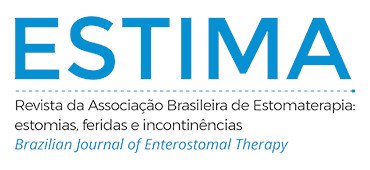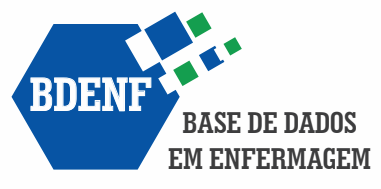Reflections on recommendations for the prevention of pressure injuries during the COVID-19 pandemic
Abstract
Objective: To reflect on specific recommendations for the prevention of pressure injuries in patients affected by the new coronavirus (COVID-19) in intensive care. Method: theoretical reflection study based on the concept of pressure injury defined by the National Pressure Injury Advisory Panel. Results: the contents were categorized into three thematic axes: specific risk factors for the development of pressure injuries for patients with COVID-19; international recommendations on pressure injuries in patients with COVID-19 and challenges for implementing recommendations for preventing pressure injuries in the face of the COVID-19 pandemic in the Brazilian scenario. Conclusion: to promote the prevention of pressure injuries in intensive care patients with COVID-19 it is essential that health professionals are able to implement advanced interventions, in order to mitigate the intrinsic and extrinsic risks specific to that patient. However, it is essential to recognize potentially preventable lesions, differentiating them from possible inevitable ones, as well as making a differential diagnosis of lesions resulting from the pathogenesis of the virus itself.
Downloads
Metrics
References
Ministério da Saúde (BR). Secretaria de Atenção especializada à saúde. Departamento de Atenção Hospitalar, domiciliar e de urgência. Protocolo de manejo clínico da COVID-19 na atenção especializada. Brasília: Ministério da Saúde; [Internet] 2020 [acesso em 29 Junho 2020]. 48 p. Disponível em: http://189.28.128.100/dab/docs/portaldab/documentos/20200504_ProtocoloManejo_ver09.pdf
Chaboyer WP, Thalib L, Harbeck EL, Coyer FM, Blot S, Bull CF, et al. Incidence and Prevalence of Pressure Injuries in Adult Intensive Care Patients: A Systematic Review and Meta-Analysis. Critical Care Medicine. [Internet] 2018 [acess July 5 2020];46(11):1074-1081. DOI 10.1097/CCM.0000000000003366.
Agencia Nacional de Vigilância Sanitária – ANVISA; Incidentes relacionados à assistência à saúde [Internet]. [acesso em 4 julho 2020]. Disponível em: https://www20.anvisa.gov.br/segurancadopaciente/index.php/publicacoes/item/brasil
Nowick J, Mullany D, Spooner A, Nowick T, Mckay P, et. al. Are pressure injuries related to skin failure in critically ill patients? Australian Critical Care. [Internet] 2020 07 [acesso 30 Maio 2020];31(5):257-263. DOI http://dx.doi.org/10.1016/j.aucc.2017.07.004. Disponível em: https://www.sciencedirect.com/science/article/abs/pii/S1036731417301753.
Cuddigan J, Black J, Capasso V, Cox J, Delmore B, Munhoz N. Unavoidable Pressure Injury during COVID-19 Pandemic: A Position Paper from the National Pressure Injury Advisory Panel. National Pressure Injury Advisory Panel (NPIAP). [Internet] 2020 Junho 16 [acesso em 30 Julho 2020];s.i(s.i):s.i. Disponível em: https://cdn.ymaws.com/npiap.com/resource/resmgr/white_papers/Unavoidable_in_COVID_Pandemi.pdf .
European Pressure Ulcer Advisory Panel. National Pressure Injury Advisory Panel. Pan Pacific Pressure Injury Alliance. Prevention and Treatment of Pressure Ulcers: Quick Reference Guide [Internet]. Emily Haesler, editor. Prevention and Treatment of Pressure Ulcers/Injuries: Quick Reference Guide. 2019. Avaliable from:https://www.epuap.org/download/11182/
Black JM, Berke CT. Deep tissue pressure injury: a clinical perspective regarding a condition that evolves under the skin. In: Gefen A, organizador. Innovations and Emerging Technologies in Wound Care. Academic Press; [Internet] 2020 [acess July 8 2020]. p. 171–81. DOI 10.1016/B978-0-12-815028-3.00010-9
Chen N, Zhou PM., Dong X, Qu J, Gong F, Han Y, et al. Epidemiological and clinical characteristics of 99 cases of 2019 novel coronavirus pneumonia in Wuhan, China: a descriptive study. The Lancet. [Internet] 2020 [acess July 6 2020];395:507-513. DOI 10.1016/ S0140-6736(20)30211-7.
Moore Z, Patton D, Avsar P, McEvoy NL, Curley G, Budri A, et al. Prevention of pressure ulcers among individuals cared for in the prone position: lessons for the COVID-19 emergency. J. Wound Care. [Internet] 2020; [acess July 3 2020]; 29(6):312–20. DOI 10.12968/jowc.2020.29.6.312.
Lucchini A, Bambi S, Mattiussi E, Elli S, Villa L, Bondi H, et al. Prone Position in Acute Respiratory Distress Syndrome Patients: A Retrospective Analysis of Complications. Dimens Crit Care Nurs. 2020; 39(1):39–46. DOI: 10.1097/DCC.0000000000000393.
Ramalho AO, Freitas PSS, Nogueira PC. Medical device-related pressure injury in health care professionals in times of pandemic. World Council of Enterostomal Therapists Journal. 2020;40(2):7-8. DOI: 10.33235/wcet.40.2.7-8.
Edsberg L, Langemo D, Baharestani M, Posthauer ME., Goldberg M. Unavoidable pressure injury: state of the science and consensus outcomes. Journal of Wound, Ostomy, Continence Nursing. 2014 ;41(4):313-334. DOI 10.1097/WON.0000000000000050.
Shen X, Zou X, Zhong X, Yan J, Li L. Psychological stress of ICU nurses in the time of COVID-19. Crit Care. 2020; 24(1):200, s13054-020-02926–2. DOI: 10.1186/s13054-020-02926-2
PARECER NORMATIVO No 002/2020 – ATUALIZAÇÃO 01, DE 28 DE MAIO DE 2020 Conselho Federal de Enfermagem - Brasil [Internet]. [acesso 8 de julho de 2020]. Disponível em: http://www.cofen.gov.br/parecer-normativo-no-002-2020_79941.html
Agência Nacional de Vigilância Sanitária (BR). RDC nº 7 de 24 de fevereiro de 2010. [acesso 13 jul 2020]; Disponível em: http://www.brasilsus.com.br/legislacoes/rdc/102985-7.html
Downloads
Published
How to Cite
Issue
Section
License
Copyright (c) 2020 Aline Oliveira Ramalho, Paula Sousa Silva Freitas, Juliano Teixeira Moraes, Paula Cristina Nogueira

This work is licensed under a Creative Commons Attribution 4.0 International License.

























